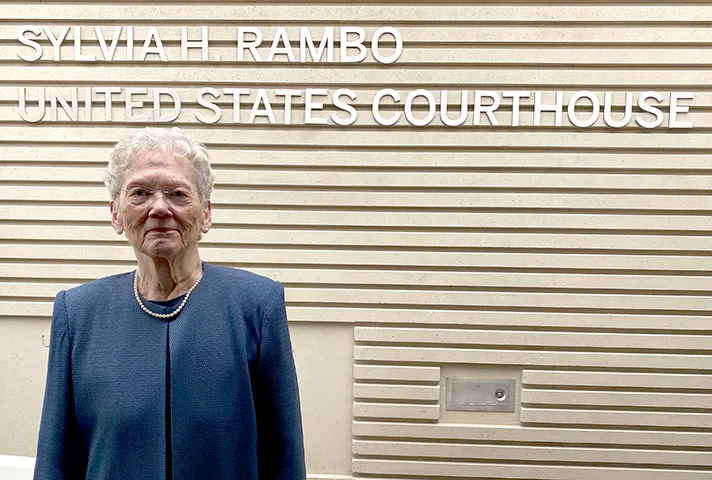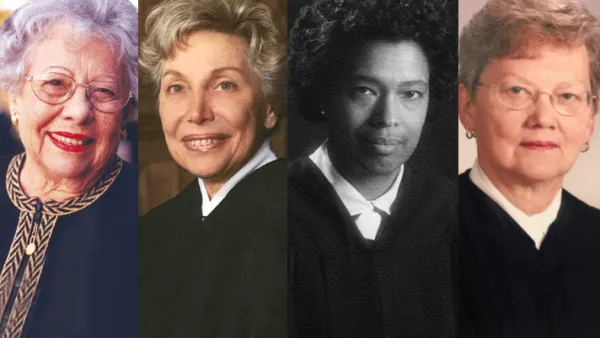Judge Sylvia H. Rambo, known by peers for her modesty and work ethic, received the rarest of professional accolades last week, when she became just one of a very few women to have a federal courthouse named in her honor.

U.S. District Judge Sylvia H. Rambo, underneath the sign of a new courthouse nearing completion in Harrisburg, Pennsylvania.
During a ceremony in Harrisburg, Pa., colleagues praised the example she set as a trailblazing woman judge, and her decades-long role in gaining approval and funding for the new courthouse, which is scheduled to open in February 2023.
“I hope you regard your marathon on this project as worth all the effort, and the frustration too,” said Judge D. Brooks Smith, of the U.S. Court of Appeals for the Third Circuit. “Your judicial work over many years speaks for itself. This courthouse, which will bear your name, becomes testament to your legacy of vision and persistence.”
Chief Judge Matthew W. Brann, of the U.S. District Court for the Middle District of Pennsylvania, said, “It is altogether fitting and appropriate that a significant public building be named for Judge Rambo in her lifetime. It reflects a permanent, public acknowledgment of the impact that Judge Rambo has had on her community and this district court.”
Characteristically unassuming, Rambo said she was “in total shock” when she was informed last year of an effort to put her name on the new courthouse. President Biden later signed legislation introduced by Pennsylvania U.S. Senators Pat Toomey and Bob Casey, Jr.
“Even as I stand here today, it feels unreal,” Rambo said. “As one of four children raised by a struggling German immigrant mother, I could never have imagined the life that has been bestowed on me, or on my name.”
Rambo, 86, was appointed to the Middle District of Pennsylvania in 1979, as part of a historic class of women federal judges. President Jimmy Carter appointed women to 23 seats in that one year. Only 10 women federal judges had been appointed in the nation’s previous 190 years. Carter, now 97, congratulated her in a letter read at the ceremony.
That appointment was just one of many firsts in Rambo’s career, noted Michael Chagares, chief judge of the Third Circuit. Rambo was the first in her family to attend college, she was the only woman in her class at Dickinson Law School, and she was the first woman to serve as chief public defender and then as a judge in Cumberland County, Pennsylvania.
Rambo is “a pioneer and a trailblazer, a legal powerhouse, a fearless, selfless and longtime warrior for the cause of justice,” Chagares said. “Judge Rambo is the embodiment of grit, determination, perseverance, and hard work.”

Chief Judge Matthew W. Brann, of the U.S. District Court for the Middle District of Pennsylvania, opens a courthouse naming ceremony in honor of U.S. District Judge Sylvia H. Rambo, left.
Judge Yvette Kane, of the Middle District of Pennsylvania, said Rambo was an inspiration to other women in the legal profession.
“I have to say thank you from all the women lawyers, law clerks, court staff and judges who followed you. You made being first look so easy, but I happen to know better,” Kane said. “Your dedication, preparation, integrity, and devotion to the rule of law elevated you, this court, and all of us. No one has worked harder, shouldering the most difficult of cases … always, always doing what was best for the court.”
Perhaps Rambo’s most challenging case was one of the first she was assigned. She handled litigation from the Three Mile Island nuclear reactor disaster, a case that lasted two decades. When she became chief judge in 1992, again the first woman to assume that role in the Middle District, Rambo began a 30-year effort to secure approval and funding for a new courthouse in Harrisburg.
Dive Deeper
Learn more about one of the largest modernizations of federal courthouses in recent decades.
“It has taken 30 years to stand before this building, a building which represents the third branch of our democracy, the Judiciary,” Rambo said. “This courthouse didn’t come easily. But as my mother taught me, once you start something, don’t you ever give up.”
Rambo said her career as judge was guided by counsel from Socrates: to hear courteously, answer wisely, consider soberly, and decide impartially.
“It is that latter quality that speaks to the independence of the Judiciary,” Rambo said. “And it is that independence that will ensure the continuation of this democracy. It is because of my respect for this institution that I have given most of my career to the federal Judiciary. I am deeply humbled to receive this distinction, and I thank everyone.”
1979: The Year Women Changed the Judiciary
The number of women serving as federal judges more than doubled in 1979. In this series, learn more about the trailblazers who reshaped the Judiciary.
Subscribe to News Updates
Subscribe to be notified when the news section is updated.

